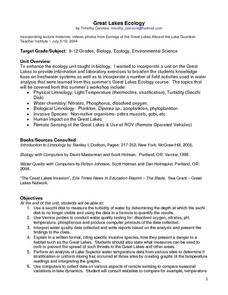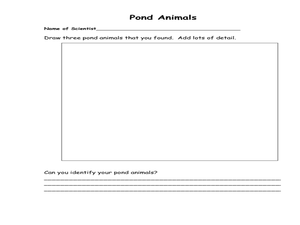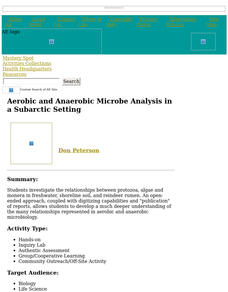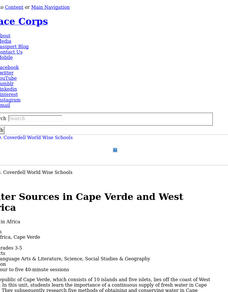Curated OER
'O'opu Life Cycle
Students investigate the life cycle of the 'o'opu also known as Hawaiian gobies. In this amphidromous living lesson, students discuss the reproductive cycle, create props and an obstacle course to demonstrate the importance of the...
Curated OER
Groundwater Resources
Students use digital maps to explore underground reservoirs. Individually, or in small groups, students access specified internet sites and research uses and locations of groundwater. Students explore the percentage of usable water,...
Curated OER
Pond Life
Environmental explorers create an experiment related to ponds and then present their finding to the class. This resource is extremely open-ended. It needs more concrete objectives and procedures for meeting them.
Curated OER
Drugged Out Daphnia
Students make predictions and investigate (using a microscope) the effects of nicotine, caffeine, aspirin, alcohol, and sleeping pills on cultures of fresh water Daphnia.
Curated OER
Great Lakes Ecology
Eighth graders identify the Great Lakes, and describe the habitat of life of a loon. They are able to point to and explain one of the major river systems that enters the Great Lakes with a focus on the Clinton River and the food webs...
Curated OER
Waterdrops
In this science worksheet, students learn about water resources and watersheds by reading and answering questions in this 8 pages newsletter. Students learn about salt vs. fresh water, discover the protective role of estuaries, learn...
Curated OER
Filtering Water to Prevent Pollution
Students explore techniques used to filter water and different pollutants. In this prevention of water pollution lesson plan, students define water pollution and list ways water is polluted. They explore water purification and complete a...
Curated OER
Water -- Here, There and Everywhere
Students compare quantities of water. In this water activity students examine the hydrologic cycle looking for the amount of fresh water that is available. Students use information from charts and diagrams.
Curated OER
Osmosis
Fifth graders explore osmosis as they watch organisms divide. In this organism lesson plan, 5th graders use potatoes to experiment with the effects of salty water in the body. Students discuss what osmosis is and record what happens in...
American Chemical Society
Density: Sink and Float for Liquids
We don't think of liquids as floating typically, but a quick look at any oil spill tells a different story. Lesson explores various densities of liquids and why this fact is important. After observing the density variation, scholars...
Curated OER
Creating a Freshwater Ecosystem
Students correctly identify some fishes of Texas and parts of their ecosystem.
Curated OER
Salt Water Wedge
Students conduct an experiment to observe the properties of both salt and freshwater. They explain why freshwater will stay at the surface while salt water will travel up a river bottom because of density. Students also research the...
Curated OER
Earth Water Distribution and Water Consumption
Students explore the need for conserving fresh water and understand that it is a limited supply. In this water consumption lesson students participate in an activity and answer questions.
Curated OER
Floating Pencil
Students discover how salt water makes a pencil float better than freshwater by measuring and comparing the lengths of the portion of the pencil that floats above the water surface. They then determine if an unknown water sample is...
Curated OER
Pond and Pond Organisms
Students explore pond ecosystems. In this pond organism activity, students will use pond water and a plastic bad in order to locate and identify freshwater organisms. The activity is designed for younger grades, but includes an...
Curated OER
Aerobic and Anaerobic Microbe Analysis in a Subarctic Setting
Students investigate the relationships between protozoa, algae and monera in freshwater, shoreline soil, and reindeer rumen. They publish reports of their findings.
Curated OER
Water Sources in Cape Verde and West Africa
Learners analyze the importance of a fresh water supply in Cape Verde, researching five methods of obtaining and conserving water there. Young scholars create and present displays demonstrating their understanding of the methods of water...
Curated OER
The Weight of Water
Students examine how salt water is more dense than fresh water. They discuss how manatees need to float and sink, conduct a sink or float experiment, and conduct an experiment with eggs and salt and fresh water.
Curated OER
The Captain And Lake Wilmar
Tenth graders examine the ecosystem of Lake Wilmar through three coordinated performance tasks. They first investigate the effects of pH on freshwater animals by comparing the zooplankton counts from three different areas. They then...
Curated OER
Got Water?
Students determine that delivering clean, fresh water to citizens around the world involves and affects politics, economics, international relations, and technology. They brainstorm a list of factors that might affect their town's...
Curated OER
Marvelous Marshes of the Chesapeake
Third graders identify sources of salt water and fresh water that enter the Chesapeake Bay. They build a model watershed and describe how runoff enters the Bay.
Curated OER
Birds, Baths And Oil Spills
Students examine effects of an oil spill on birds and animals that inhabit marine or freshwater ecosystems, and simulate procedures used by rescue workers who rescue and rehabilitate birds and other animals coated with oil.
Curated OER
Out of the Deep
Learners observe, describe, and record characteristics of ocean animals (mammals and fish) and sea shells. They conduct an experiment comparing and contrasting sugar water, salt water and fresh water and create a mural of coral reef...
Curated OER
Marine & Aquatic Habitats Activities - Walk in the Wetlands
Students research various types of fresh water wetlands and identify the common animal and plant life in these different ecosystems. They further analyze the need to protect these wetlands and explore their varied uses.

























